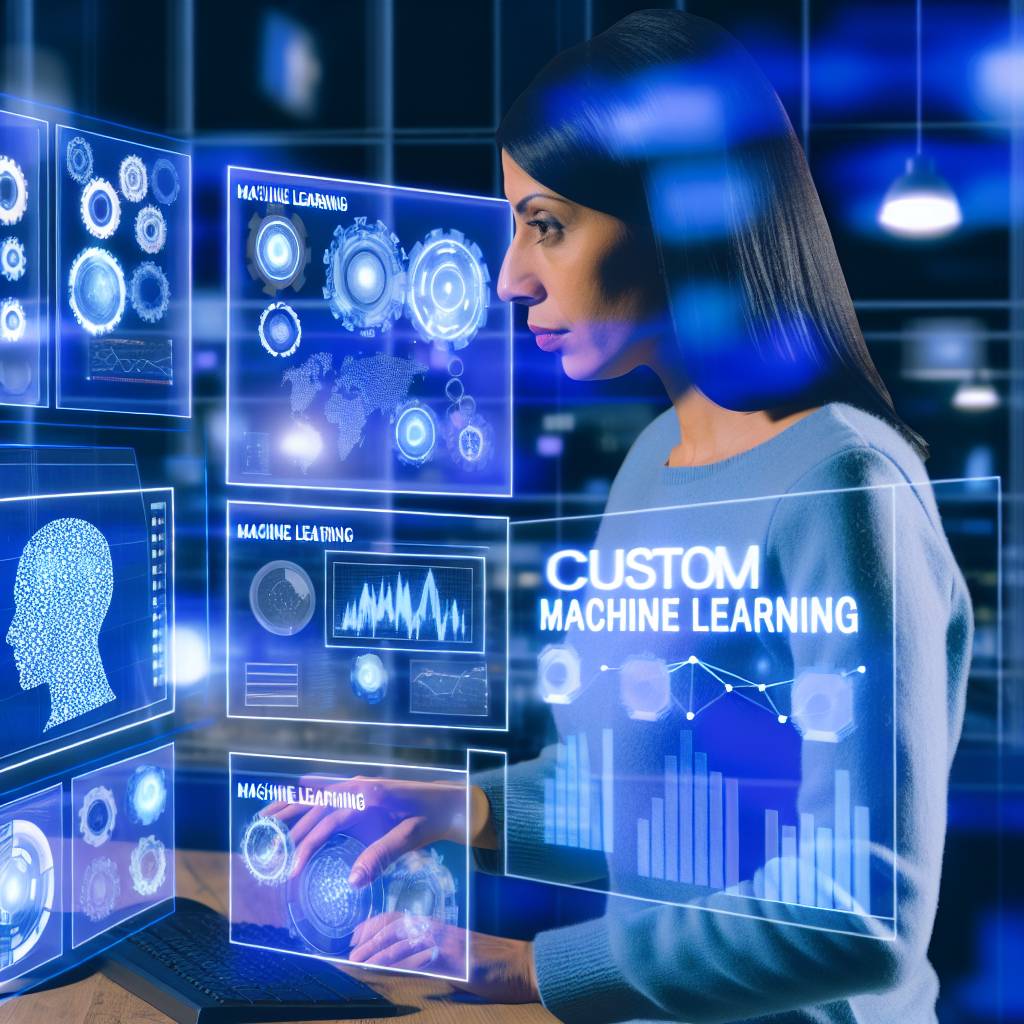Introduction
Overview of the importance of learning in the modern world.
In today’s fast-paced world, continuous learning plays a crucial role in personal and professional growth.
Technology increasingly shapes our understanding and approach to education.
As people face new challenges, traditional learning methods become less effective.
This is where AI-powered learning assistants come into play.
The concept of AI-powered learning assistants.
AI-powered learning assistants are intelligent tools that use artificial intelligence to enhance the learning experience.
These innovative solutions tailor educational content to meet the individual needs of learners.
They analyze student behavior, preferences, and performance to provide personalized support.
As a result, learners can engage more effectively with their studies.
The purpose of the blog post: to explore how these tools are transforming education and knowledge acquisition.
This blog post explores how AI-powered learning assistants revolutionize education and streamline knowledge acquisition.
First, we will examine the personalized learning experiences these tools provide.
These assistants analyze a learner’s strengths and weaknesses, enabling them to suggest tailored resources and study schedules.
This targeted approach promotes efficient learning by eliminating unnecessary content.
Next, we will consider how AI-powered tools facilitate instant feedback.
Traditional educational settings often limit immediate response times.
In contrast, AI-driven platforms can promptly assess a learner’s progress, helping them to understand their mistakes and correct them in real time.
This encourages a growth mindset and improves overall retention of knowledge.
Furthermore, AI-powered learning assistants can boost engagement by incorporating gamification elements.
By turning learning into an interactive experience, students remain motivated and invested in their education.
These tools foster a sense of achievement and reward, making even the toughest subjects enjoyable.
Lastly, we will address the scalability of AI-powered learning assistants in educational settings.
They can support large numbers of students simultaneously while maintaining personalized interactions.
This ensures that every student receives the attention they need, regardless of classroom size.
Through this exploration, we hope to highlight the transformative potential of AI-powered learning assistants in modern education.
Understanding AI-Powered Learning Assistants
AI-powered learning assistants represent a significant advancement in educational technology.
These digital tools harness the capabilities of artificial intelligence to enhance the learning experience.
They cater to various learning styles, helping students absorb information effectively.
By providing personalized support, these assistants revolutionize traditional educational methods.
Definition of AI-Powered Learning Assistants
AI-powered learning assistants refer to software applications that utilize artificial intelligence to improve the learning process.
These tools can adapt to individual learners’ needs, providing tailored instruction.
They facilitate interactive learning by engaging users through conversations or tasks.
The aim is to promote understanding and retention of knowledge.
Unlike traditional learning tools, AI-powered assistants learn from user interactions.
This capability allows them to refine their approaches over time.
They analyze performance data to customize future lessons.
As a result, students experience a more personal and effective learning journey.
We Design & Develop Websites, Android & iOS Apps
Looking to transform your digital presence? We specialize in creating stunning websites and powerful mobile apps for Android and iOS. Let us bring your vision to life with innovative, tailored solutions!
Get Started TodayOverview of the Technology Behind AI
Understanding the technology behind AI-powered learning assistants involves delving into two main components: natural language processing (NLP) and machine learning (ML).
Natural Language Processing (NLP)
NLP allows computers to understand and interpret human language.
Components of NLP
- Speech Recognition: Enhances verbal interaction between learners and AI.
- Sentiment Analysis: Assesses user emotions to tailor responses accordingly.
- Text Generation: Produces coherent and contextually relevant content for learners.
Machine Learning (ML)
ML enables systems to learn from data without explicit programming.
Steps in the ML Process
- Data Collection: Collecting user interactions and performance data.
- Model Training: Developing algorithms to predict user needs based on past behavior.
- Model Evaluation: Testing models to ensure accuracy and effectiveness.
These technologies blend seamlessly to create adaptive learning experiences.
They empower students by responding to inquiries in real-time.
As a result, students receive immediate feedback and guidance, fostering a more engaging learning environment.
Examples of Existing AI Learning Platforms
Numerous AI-powered learning platforms have emerged, each offering unique features and targeting different audiences.
Here are some notable examples:
- ChatGPT: An advanced conversational AI that engages users in discussions, provides explanations, answers questions, and offers study tips. It adapts responses based on user inputs.
- Duolingo: A language-learning app using gamification and AI. It tailors exercises to individual progress, providing immediate feedback and encouraging continuous improvement.
- Khan Academy: This platform customizes learning experiences through AI. It assesses abilities and recommends resources, offering instructional videos, quizzes, and practice exercises across various subjects.
- Babbel: A language-learning app that adapts lessons to individual proficiency levels, focusing on real-life conversational skills for relevance and effectiveness.
- Coursera: An online platform offering courses across diverse fields. AI recommends courses based on users’ academic backgrounds and interests, offering performance insights.
These platforms showcase the versatility of AI-powered learning tools.
They address various educational needs, from language learning to academic tutoring, and create personalized, engaging learning environments.
By using technologies like natural language processing and machine learning, these platforms foster deeper understanding and more effective learning.
As AI continues to advance, the potential for further innovation in education remains vast.
These tools will shape a new era of interactive and personalized learning, benefiting both students and educators.
In summary, AI-powered learning assistants revolutionize how individuals acquire knowledge, catering to different learning styles and preferences.
Their development will continue to influence educational practices for years to come.
Read: Revolutionize PDF Marketing with Custom Flipbook Integration Tools
Benefits of AI-Powered Learning Assistants
Artificial intelligence (AI) is reshaping many industries, and education is no exception.
AI-powered learning assistants are transforming the way individuals acquire knowledge.
They enhance learning through personalization, accessibility, instant feedback, and engagement.
In this section, we will explore these benefits in more detail.
Personalization
Personalization in learning refers to customizing experiences to meet individual needs.
AI-powered learning assistants excel in this area by monitoring progress and adapting to student preferences.
- Customized Learning Paths: These assistants can create unique learning paths. They analyze student behavior to identify strengths and weaknesses.
- Tailored Content: They provide content based on learning styles. Some students learn better through visual aids, while others prefer interactive exercises.
- Adaptive Difficulty: AI can adjust the difficulty of challenges. This ensures learners stay motivated without feeling overwhelmed.
- Identifying Gaps: They can pinpoint knowledge gaps effectively. This allows for targeted interventions at the right time.
This level of personalization makes learning more efficient and engaging.
Students feel more in control of their educational journey, which enhances their overall experience.
Personalization leads to deeper understanding and retention of information.
Accessibility
Accessibility in education ensures that everyone has the opportunity to learn.
AI-powered learning assistants enhance accessibility for diverse populations.
- Diverse Learning Styles: They cater to various learning styles, making materials more inclusive. Different students benefit from different approaches.
- Language Support: AI can translate content in real-time. This feature aids non-native speakers in understanding complex subjects.
- Remote Learning: Learning assistants bridge gaps for students in isolated areas. They provide resources that may not be available locally.
- Special Needs Support: AI technologies assist students with disabilities. They offer features that enhance accessibility, such as speech-to-text options.
By increasing accessibility, AI-powered learning assistants democratize education.
They create equitable learning environments for students from various backgrounds.
This fosters inclusivity, enhancing overall knowledge acquisition.
Instant Feedback
Feedback is crucial for effective learning. AI-powered learning assistants offer immediate responses, which significantly improves the educational process.
- Real-Time Assessments: These assistants provide instant evaluations of quizzes and assignments. This helps students understand their mistakes without delay.
- Guided Corrections: They not only highlight errors but also suggest improvements. This feature guides learners through their thought processes.
- Performance Tracking: AI monitors continuous performance and trends. This helps students recognize areas for improvement over time.
- Adaptive Learning Suggestions: Based on performance feedback, AI suggests additional resources. This creates a loop of continuous learning and self-improvement.
Instant feedback fosters a proactive learning environment.
Students are motivated to correct mistakes promptly.
This continuous loop of feedback fuels their learning and helps build confidence.
Engagement
Engagement is a vital component of successful learning experiences.
We Design & Develop Websites, Android & iOS Apps
Looking to transform your digital presence? We specialize in creating stunning websites and powerful mobile apps for Android and iOS. Let us bring your vision to life with innovative, tailored solutions!
Get Started TodayAI-powered learning assistants boost student motivation and interaction.
- Interactive Learning: They offer gamified elements that make education enjoyable. Gamification encourages exploration and creativity among learners.
- Multimedia Resources: These assistants present information in diverse formats. Videos, podcasts, and interactive simulations enhance the overall learning experience.
- Social Learning Opportunities: AI can connect students for collaborative projects. This builds a sense of community and peer support.
- Continuous Engagement: They use prompts and reminders to keep students focused. This reduces procrastination and encourages consistent study habits.
Engaged students are more likely to absorb and retain information.
The use of interactive technologies fosters curiosity and a love for learning.
This results in a robust educational experience.
AI-powered learning assistants are revolutionizing education by offering numerous benefits.
From personalization and accessibility to instant feedback and engagement, these technologies significantly enhance the learning process.
They cater to individual needs, making education more inclusive and enjoyable.
With AI, learning becomes a dynamic and tailored experience, fostering a new era of knowledge acquisition.
As technology advances, we can anticipate even more innovative features emerging.
The future of education looks promising with AI-powered learning assistants at the forefront.
Embracing these tools will prepare learners for success in a rapidly changing world.
Read: Automated Review Outreach: Boost Sales and Build Online Reputation
The Role of AI in Tailored Learning Experiences
Artificial intelligence (AI) empowers educators and learners through personalized learning experiences.
Tailored learning adjusts to individual needs, enhancing the education process for every student.
Traditional education often applies a one-size-fits-all teaching style.
AI transforms this model by creating unique paths for each learner.
This transformation stems from the advanced adaptive learning algorithms that power AI-driven platforms.
Adaptive Learning Algorithms
Adaptive learning algorithms analyze learner behavior in real time.
These algorithms assess how students interact with content.
They consider behaviors such as:
- Time spent on each question.
- Response accuracy.
- Patterns in problem-solving approaches.
- Engagement levels with different formats (e.g., videos, quizzes).
Based on these metrics, the algorithms dynamically adjust learning materials.
They can recommend additional resources for topics where students struggle.
Likewise, they may advance students to more challenging content if they demonstrate proficiency.
This continuous adjustment creates a fluid and engaging learning experience.
How AI Analyzes User Performance
The analysis of user performance forms the backbone of personalized learning.]
AI examines vast amounts of data to derive actionable insights.
These insights enable more effective learning strategies tailored to each learner.
The process typically involves several key steps:
- Data Collection: AI platforms gather data from user interactions.
- Performance Evaluation: The system evaluates progress through quizzes and assignments.
- Content Recommendation: Based on evaluation, AI suggests the next steps for learners.
- Feedback Loop: Continuous analysis allows for ongoing adjustments to learning plans.
This process is not merely reactive; it is predictive.
AI forecasts future learning needs based on past performance.
Consequently, learners receive the right content at the right time.
They can thus build a solid foundation before tackling more complex subjects.
This adaptability helps maximize engagement and retention.
Case Studies and Successful Implementations
Many educational platforms utilize AI to deliver tailored learning experiences.
These platforms showcase the effectiveness of adaptive learning.
We Design & Develop Websites, Android & iOS Apps
Looking to transform your digital presence? We specialize in creating stunning websites and powerful mobile apps for Android and iOS. Let us bring your vision to life with innovative, tailored solutions!
Get Started TodayLet’s explore two noteworthy examples: Khan Academy and Coursera.
Khan Academy
Khan Academy revolutionized online education by personalizing the learning journey for each student.
Their platform uses AI to track student progress over time.
This allows the system to identify areas needing improvement.
Here’s how Khan Academy achieves this:
- Skill Mastery: Students advance only after demonstrating mastery of a topic.
- Custom Learning Dashboards: Learners receive dashboards that highlight strengths and weaknesses.
- Adaptive Exercises: The platform adjusts exercise difficulty based on student performance.
Through these methods, Khan Academy fosters greater engagement.
Students feel empowered to learn at their own pace.
They can focus on areas that interest them while receiving the necessary support.
Coursera
Coursera also employs AI-driven adaptive learning to enhance user experience.
The platform features personalized course recommendations.
This feature relies on user behavior, interests, and previous course completions.
Here’s how Coursera implements tailored learning:
- Learning Paths: Users can follow curated learning paths based on their goals.
- Dynamic Assessment: Quizzes adapt in difficulty based on user responses.
- Peer Reviews: Feedback from peers enhances content understanding and personal growth.
As a result, Coursera attracts learners from diverse backgrounds.
Their personalized approach caters to novice users and advanced learners alike.
The platform effectively sets the stage for lifelong learning.
The Future of Tailored Learning
As educational technology continues to evolve, so does the role of AI.
Future developments may offer even more sophisticated approaches to learning.
We can anticipate several trends in tailored learning experiences:
- Greater Integration of AI Tools: Expect more platforms to integrate advanced AI features.
- Enhanced Data Privacy Measures: Learners will demand better protection of their personal data.
- Emphasis on Soft Skills Development: AI will increasingly focus on nurturing soft skills alongside academic knowledge.
The increasing demand for personalized education supports these trends.
AI-powered learning assistants will play a critical role in shaping these experiences.
By adapting to individual needs and performance, they will redefine how knowledge is acquired.
AI-powered learning assistants stand at the forefront of education innovation.
Tailored learning experiences enhance knowledge acquisition for students everywhere.
They foster engagement, promote mastery, and accommodate diverse learning styles.
The future holds exciting possibilities for integrating AI in education.
As we embrace these advancements, we empower learners to achieve their full potential.
Read: Revolutionize Campaign Tracking with Advanced Dynamic QR Code Solutions

Challenges and Limitations of AI-Powered Learning Assistants
As education advances through technological innovation, AI-powered learning assistants emerge as powerful tools.
However, the utilization of these tools is not without challenges and limitations.
Understanding these critical concerns is vital for educators, students, and developers alike.
This section delves into three significant challenges concerning AI-powered learning assistants: potential biases in AI algorithms, the need for human oversight, and data privacy concerns.
Potential Biases in AI Algorithms
AI algorithms inherently depend on the data used to train them.
This reliance often leads to biases that can have significant implications.
Such biases may skew the learning experience for students globally.
Identifying and addressing biases must become a priority.
We Design & Develop Websites, Android & iOS Apps
Looking to transform your digital presence? We specialize in creating stunning websites and powerful mobile apps for Android and iOS. Let us bring your vision to life with innovative, tailored solutions!
Get Started TodayHere are some common types of biases found in AI:
- Data Bias: Training data may not represent diverse populations accurately. This lack of representation can confine the AI’s ability to cater to all learners effectively.
- Algorithmic Bias: The algorithms themselves might favor certain patterns. This tendency can lead to inaccurate predictions and recommendations for users.
- Cultural Bias: Most AI tools may reflect cultural norms of the developers. Such biases can alienate students from different backgrounds.
These biases directly affect the quality of education provided.
Students may receive information that does not align with their unique learning needs.
It can also contribute to reinforcing stereotypes, hindering inclusive education.
Therefore, continuous evaluation and refinement of AI algorithms are essential.
Education stakeholders must prioritize inclusive learning strategies.
This focus will help mitigate biases while enhancing the learning experience for all students.
The Importance of Human Oversight
Despite AI’s remarkable capabilities, human oversight remains crucial in educational settings.
AI tools function best when they supplement, not replace, human educators.
Educators have unique insights into student needs that AI cannot replicate.
Here are several reasons why human oversight is vital:
- Understanding Nuances: Educators grasp the subtle nuances of student behavior. They can intervene when AI misinterprets a student’s needs.
- Fostering Relationships: Building connections between teachers and students fosters a supportive learning environment. AI lacks the ability to nurture these relationships effectively.
- Addressing Ethical Issues: Educators can navigate ethical dilemmas that arise from the use of technology. They ensure that AI aids without compromising educational integrity.
Human oversight ensures that AI-powered learning assistants remain aligned with educational objectives.
Educators can monitor the learning process closely to evaluate the effectiveness of AI tools.
They also have the responsibility to interpret AI-generated insights and act accordingly.
Therefore, maintaining a collaborative relationship between educators and AI assistants enhances the overall educational experience.
Data Privacy Concerns
As AI-powered learning assistants collect and analyze vast amounts of data, privacy concerns arise.
These tools frequently track users’ interactions and learning patterns.
Consequently, the safety of sensitive user information becomes paramount.
Here are some pressing data privacy issues:
- Information Security: Protecting users’ personal information against breaches is crucial. Incidents of data breaches can lead to significant harm.
- Informed Consent: Users must understand how their data will be used. Ensuring informed consent is critical for building trust in educational technologies.
- Data Usage Transparency: AI systems should clearly outline how they collect and use data. Transparency can help users feel more secure and informed.
These challenges necessitate strict data protection regulations.
Institutions must implement robust policies to safeguard user information.
Furthermore, engaging with students about data privacy can help build trust.
Educators should address concerns surrounding data collection openly.
This proactive stance ensures a safe learning environment while allowing the effective use of AI-powered tools.
AI-powered learning assistants hold great potential for revolutionizing education.
However, recognizing their limitations is crucial.
Biases in algorithms, the need for human oversight, and data privacy concerns present significant challenges.
Addressing these issues paves the way for effective implementation of AI technologies.
A focus on collaboration between educators and AI tools enhances the learning experience for all students.
As education continues to evolve, navigating these challenges becomes increasingly important.
Ultimately, effective integration of AI can lead to innovative pathways for knowledge acquisition.
Read: Revolutionizing Client Engagement with Advanced SMS Marketing Tech
The Future of AI in Education
Artificial Intelligence (AI) continues to transform education.
Many educators embrace it as a tool to enhance learning experiences.
AI-powered learning assistants emerge as essential components of modern educational frameworks.
We Design & Develop Websites, Android & iOS Apps
Looking to transform your digital presence? We specialize in creating stunning websites and powerful mobile apps for Android and iOS. Let us bring your vision to life with innovative, tailored solutions!
Get Started TodayThese tools offer personalized learning pathways tailored to individual needs.
They facilitate real-time feedback, enhancing students’ understanding and retention of information.
Trends in AI Development and Their Potential Impact on Learning
AI technology evolves rapidly, influencing various sectors, including education.
Several trends stand out in this evolution:
- Personalized Learning Experiences: AI algorithms analyze students’ learning styles and preferences. They adapt content and recommendations based on individual progress.
- Smart Content Creation: AI tools can generate educational materials tailored to specific topics or skills. This capability minimizes the time teachers spend on content preparation.
- Data-Driven Insights: AI systems collect and analyze vast amounts of data. Educators gain insights into student performance, allowing for targeted interventions.
- Enhanced Engagement: AI-powered gamification tools create engaging learning environments. They motivate students through interactive and competitive features.
- Virtual Learning Environments: AI chatbots and virtual tutors are designed to provide support anytime. They ensure that students have access to resources around the clock.
The impact of these trends on learning is significant.
For instance, personalized learning opens pathways for every student.
Traditional one-size-fits-all methods often leave some students behind.
AI’s ability to adjust content dynamically helps bridge this gap.
Predictions for AI’s Role in Educational Methods and Access
Looking ahead, we can foresee several changes in educational methods due to AI:
- Increased Accessibility: AI technologies will democratize access to quality education. Students in remote areas will benefit from online resources and virtual classes.
- Hybrid Learning Models: Blended learning environments will become commonplace. Students will alternate between in-person and online sessions, maximizing flexibility and convenience.
- AI-Assisted Educators: Teachers will utilize AI to enhance their teaching strategies. This will allow them to focus on complex learning challenges requiring human empathy.
- Adaptive Assessments: Assessments will evolve to become adaptive and personalized. AI will tailor questions based on real-time performance, fostering a more accurate measurement of understanding.
- Collaborative Learning Platforms: AI will facilitate group projects across distances. Students from different geographical locations can collaborate effectively using AI-enhanced tools.
These predictions highlight the growing significance of AI in education.
Enhanced accessibility and innovative learning models promise greater inclusivity and engagement.
As AI continues to improve, its application will likely expand.
The educational landscape will shift dramatically as a result.
The Role of AI in Lifelong Learning and Professional Development
Lifelong learning is essential in a rapidly changing world. AI plays a key role in continuous professional development. Here’s how AI enhances learning:
- Real-Time Skill Assessment: AI assesses skills and identifies knowledge gaps instantly, offering tailored learning modules.
- Industry-Relevant Training: AI ensures training aligns with current industry needs, keeping professionals competitive.
- Flexible Learning Options: AI-driven platforms offer flexible schedules, allowing professionals to learn at their own pace.
- Networking Opportunities: AI connects learners with industry experts and peers for mentorship and collaboration.
- Microlearning: AI delivers bite-sized lessons, enabling quick skill acquisition without overwhelming learners.
As continuous learning becomes the norm, AI’s role will grow.
It will provide access to vast resources for both career advancement and personal growth.
The future of AI in education promises exciting advancements.
We expect AI to shape educational methods, making learning more personalized and accessible.
AI will empower individuals to adapt to workforce changes by developing new skills.
However, thoughtful integration is key to ensuring that AI enhances, rather than detracts from, the learning experience.
In summary, AI-powered learning assistants will revolutionize how we acquire knowledge.
The continued evolution of AI promises innovative solutions for both educators and learners, leading to personalized and lifelong learning opportunities.
The future looks bright for AI in education.
Integrating AI Learning Assistants into Traditional Educational Frameworks
As educational landscapes evolve, Artificial Intelligence (AI) is gaining traction in classrooms worldwide.
Educators recognize the potential of AI-powered learning assistants.
Integrating these tools can enhance traditional teaching methods.
This section explores strategies for educators to successfully incorporate AI in their classrooms.
Strategies for Educators
Educators can implement several strategies to introduce AI tools effectively.
These strategies can help create a seamless learning experience:
- Start Small: Begin with one or two AI tools. This approach allows educators to assess their effectiveness without overwhelming students.
- Select the Right Tools: Choose AI tools that align with specific learning objectives. Ensure these tools suit the subject matter and student demographics.
- Provide Training: Educators should undergo training on using AI tools. This preparation ensures they can provide support and guidance to students.
- Encourage Student Participation: Involve students in the selection process. Their input can lead to greater acceptance and engagement with the technology.
- Monitor Progress: Set specific metrics to evaluate AI tool effectiveness. Use analytics to track student engagement and performance. Adjust strategies based on the data.
Finding Balance
Balancing technology and traditional teaching methods is crucial.
While AI provides numerous benefits, it cannot fully replace educators.
Here’s how to achieve that balance:
- Integrate AI as a Supplement: Use AI to complement traditional instruction. Employ AI tools for tasks like grading, assessment, or personalized learning pathways.
- Maintain Human Interaction: Preserve face-to-face interactions. Both students and teachers must continue to engage in meaningful discussions.
- Utilize Flipped Classrooms: Implement a flipped classroom model. Students can learn at their own pace through AI tools at home, while teachers facilitate discussions in class.
- Focus on Critical Thinking: Encourage critical thinking skills. Use AI tools to pose challenging questions that require deeper analysis and understanding.
- Evaluate and Reflect: Regularly assess the impact of AI integration. Seek feedback from students and teachers to refine approaches continually.
Examples of Successful Integration
Several institutions have successfully integrated AI-powered learning assistants into their educational frameworks.
These examples provide valuable insights:
- Carnegie Mellon University: This university uses an intelligent tutoring system called “Cognitive Tutor.” It personalizes learning experiences for students in mathematics.
- Knewton: Knewton offers adaptive learning platforms. It adjusts content to meet individual student needs based on their performance and learning pace.
- Duolingo: Duolingo leverages AI to teach languages. The app personalizes lessons and provides instant feedback to learners.
- Georgia State University: This university implemented AI chatbots to support student advising. The chatbots assist students with course selections and scheduling.
- IBM Watson: Watson’s Education solutions create tailored learning experiences. Schools using Watson report higher student engagement and better learning outcomes.
Impacts on Learning
Integrating AI tools results in multiple positive impacts on the learning environment.
We Design & Develop Websites, Android & iOS Apps
Looking to transform your digital presence? We specialize in creating stunning websites and powerful mobile apps for Android and iOS. Let us bring your vision to life with innovative, tailored solutions!
Get Started TodayBelow are key benefits experienced by educators and students:
- Personalized Learning: AI provides personalized learning experiences. Each student can learn at their own pace, promoting better understanding.
- Efficient Assessment: AI streamlines assessment processes. Educators can focus more on teaching rather than grading papers and tests.
- Data-Driven Insights: AI tools offer valuable data analytics. Educators can identify learning gaps and adjust instruction accordingly.
- Enhanced Engagement: Interactive AI tools increase student engagement. Gamification elements in learning applications create interest and motivation.
- Support for Diverse Learners: AI assists teachers in reaching diverse learners. Adaptations for different learning styles enhance the educational experience for all.
Challenges and Considerations
Despite the advantages, integrating AI learning assistants comes with challenges.
Here are some considerations educators must keep in mind:
- Technological Limitations: Not all AI tools function seamlessly. Educators must be prepared to troubleshoot technical issues as they arise.
- Equity of Access: Ensure all students have equal access to technology. Addressing the digital divide is essential for equitable learning opportunities.
- Data Privacy: Protecting student data is crucial. Educators must understand and inform students about data privacy regulations.
- Professional Development: Continuous professional development opportunities are necessary. Educators must remain knowledgeable about emerging AI technologies.
- Resistance to Change: Some educators may resist AI integration. Clear communication about the benefits of AI can help mitigate this resistance.
In fact, integrating AI-powered learning assistants into traditional educational frameworks revolutionizes knowledge acquisition.
By leveraging effective strategies, educators can balance technology with traditional teaching methods.
Moreover, successful examples demonstrate the enormous potential of AI in enhancing educational outcomes.
However, educators must also address the challenges associated with AI integration.
This journey requires commitment, adaptability, and a passion for creating better learning experiences.
Conclusion
Recap of the transformative potential of AI-powered learning assistants in education.
AI-powered learning assistants are transforming education, offering personalized and dynamic learning experiences.
They analyze individual learning patterns, adjusting content to suit each user.
This capability enhances engagement and optimizes knowledge retention.
Furthermore, these technologies provide immediate feedback, which fosters continuous improvement in learners.
Emphasizing on the ongoing evolution of learning tools and their implications for future learning.
The ongoing evolution of educational tools suggests a future where learning is more accessible and tailored.
AI continues to bridge gaps in traditional educational methods, making information more reachable.
Learners can interact with AI assistants anytime, anywhere.
This flexibility encourages self-directed learning and empowers students to take charge of their educational journeys.
As we embrace this technology, we must also remain cognizant of potential challenges.
Issues such as data privacy, equity of access, and the impact on traditional pedagogies warrant careful consideration.
Ethical use of AI technologies should guide their integration into educational environments.
Establishing solid frameworks for accountability and transparency will safeguard learners’ interests.
Call to action for educators and learners to embrace AI technologies while mindful of their challenges and ethical considerations.
Educators and learners must adopt AI technologies thoughtfully.
Embracing these tools can significantly enhance learning outcomes while encouraging innovation.
However, they should also engage in conversations about the implications of technology in education.
Understanding and addressing ethical considerations will shape the successful integration of AI.
AI-powered learning assistants hold immense transformative potential in education.
Their ability to personalize learning experiences provides unprecedented opportunities for students worldwide.
As the landscape of learning technologies continues to evolve, we must encourage adaptability and awareness among all stakeholders.
By balancing the innovative use of AI with ethical considerations, we can harness its full potential for future generations.
Before You Go…
Hey, thank you for reading this blog post to the end. I hope it was helpful. Let me tell you a little bit about Nicholas Idoko Technologies.
We help businesses and companies build an online presence by developing web, mobile, desktop, and blockchain applications.
We also help aspiring software developers and programmers learn the skills they need to have a successful career.
Take your first step to becoming a programming expert by joining our Learn To Code academy today!
Be sure to contact us if you need more information or have any questions! We are readily available.
Put Your Tech Company on the Map!
Get featured on Nicholas Idoko’s Blog for just $200. Showcase your business, boost credibility, and reach a growing audience eager for tech solutions.
We Design & Develop Websites, Android & iOS Apps
Looking to transform your digital presence? We specialize in creating stunning websites and powerful mobile apps for Android and iOS. Let us bring your vision to life with innovative, tailored solutions!
Get Started Today










